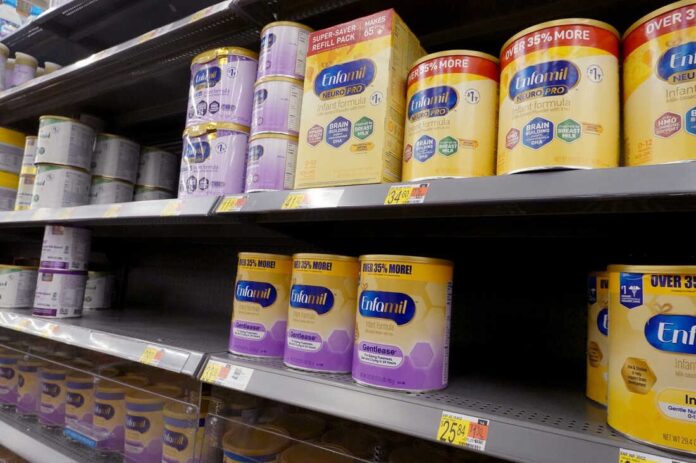America’s baby formula shortage hits some of its biggest brands and leaves parents panicked. An ongoing supply disruption mixed with a recent safety recall leaves shelves everywhere empty. Millions of babies who are not breastfed depend on formula as their source of nutrients. Most baby formulas contain protein from cow’s milk that was altered for easier digestion and enhanced with extra nutrients needed for growth and development. The FDA sets specific nutritional requirements on the formula, and formula makers achieve those levels by adding various sugars, oils, and minerals. The formula mimics breast milk, although study shows breast milk is healthier.
Unfortunately, the problem started last year as the COVID-19 pandemic led to labor, transportation, and raw materials interruptions. Then at the beginning of the year, Abbott Nutrition recalled several notable brands of powdered baby formula. Abbott is one of several companies that produce the vast majority of the U.S. formula supply. Therefore, their recall wiped out a considerable part of the market. In addition, they had to shut down their Sturgis, Michigan factory when federal officials began investigating four babies who suffered bacterial infections after consuming formula coming from the facility.
Do Not Shame Women Who Cannot Breastfeed
Health officials recommend women breastfeed their babies until six months. However, not all women can do so and should not be shamed into thinking they’re “bad mothers.” It is highly inappropriate to tell women to “just breastfeed” to respond to this devastating crisis. But sadly, some have taken to Twitter and openly shamed mothers for not being able to do so.
Mothers face several challenges with breastfeeding, including returning to work and finding the time and equipment needed to pump breast milk. State and federal laws encourage breastfeeding during break times and require accommodations for infants’ mothers. Some infants require specialty formulas due to allergies, digestive problems, etc.
According to the CDC, about 60% of mothers stop breastfeeding sooner than planned. Breastfeeding rates have consistently been lower among Black babies than in any other group. About three-quarters of Black babies are breastfed in infancy, below the national average of 84%.
What Can Parents Do If They Cannot Find Baby Formula?
If parents cannot locate baby formula in their area, they should talk to their pediatrician or call local food banks to see if they can help locate some options. Experts also recommend parents check smaller stores and pharmacies. Parents shouldn’t be afraid to buy a different brand if they’re having trouble finding their usual brand. Most regular baby formulas contain the same essential ingredients and nutrients. If parents need specialty formula, then they should talk to their doctor. Manufacturers usually distribute specialty formulas through pharmacies and clinics.
Families On WIC And Food Stamps Hit The Hardest
Recently, President Biden spoke with leaders of significant formula manufacturers to develop a solution. They spoke about increasing production and what his administration could do to help. The administration plans to monitor possible price gouging. They will also work on imports with trading partners in Mexico, Chile, Ireland, and the Netherlands. According to health officials, 98% of baby formula consumed in the U.S. is domestically made.
The shortage is weighing particularly on lower-income families. The recall wiped out most of the brands covered by WIC. WIC is a federal program like food stamps that serves women, infants, and children, though the program now permits brand substitutions. The Biden Administration is working with states to make it easier for WIC recipients to buy different sizes of formula that their benefits might not cover. According to the White House, about half of infant formula nationwide is purchased by participants using WIC benefits.
When Will We See An End To The Shortage?
The FDA launched its investigation after four babies became ill with a rare bacterial infection after consuming the baby formula. All four babies were hospitalized, and two died. Abbott released a statement, “there is no evidence to link our formulas to these infant illnesses.” The bacteria samples collected from the infants didn’t match those found in the company’s factory. pending FDA approval, “we could restart the site within two weeks.”
The company would start producing EleCare, Alimentum, and metabolic formulas and then on Similac. Once production begins, it would take about six to eight weeks to make the formula available on shelves.






